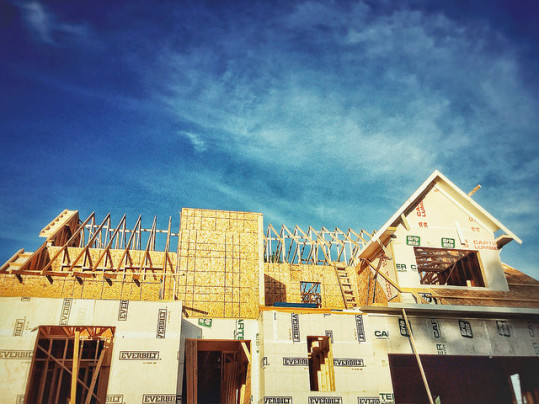Most of the economic indicators that were a concern just a few years ago have since turned positive. Fewer Americans are unemployed and an increasing number say they feel confident in their job and about their financial situation. In other words, following years of uncertainty, Americans are beginning to feel more economically comfortable. This should be good news for the housing market, as people who feel secure financially are more likely to want to buy a home. However, though buyer demand has increased, at the same time, there have been fewer homes on the market. Because of this, home prices have been rising. That causes concern for potential home buyers. Fortunately, however, though the latest S&P Case-Shiller Home Price Indices shows prices still climbing in most major markets, otherwise favorable conditions have helped soften the impact of higher prices. In addition, recent numbers show a positive trend in the new home market, which is crucial to slowing the rate at which prices increase. Combined, good conditions and more new homes could lead to a more balanced housing market in the next year. More here.
Archive for November 2017
Where To Look To Eliminate Your Home’s Odors
Your sense of smell can be a peculiar thing. Odors that overwhelm some people, don’t affect others. And odors that you’re accustom to seem to disappear altogether after a while. So it’s no surprise that homeowners might worry that their home may be giving off an unpleasant scent. And, during the holidays, this becomes even more of a concern, as it’s a popular time of year to have houseguests. Fortunately, there are some fairly common places you can target to ensure that you’ve eliminated any odors that may be going undetected. One of the more obvious targets is pets. If you have animals in your home, make sure you clean their favorite places, pillows, beds, and blankets, etc. Basements and bedding are also common places for odors to linger. Mold and mildew can cause mustiness in basement areas but can also be detected by sight, which makes addressing it even easier. Be sure also to keep your bedding clean and your mattress fresh. Another obvious spot to check for odors is your refrigerator and freezer. Check that there’s no grime, grit, or leftovers lurking in the back that are emitting odors. Overall, paying some regular attention to these hot spots can help remove any worry about how your home smells to holiday houseguests or, if you’re selling your home, potential buyers. More here.
New Home Sales Rise To 10-Year High
Sales of newly built homes improved unexpectedly in October, according to new estimates from the U.S. Census Bureau and the Department of Housing and Urban Development. Sales rose 6.2 percent over the previous month and are now 18.7 percent higher than they were at the same time last year. It was the third consecutive month new home sales increased. Along with recent improvements to builder confidence and housing construction, October’s sales increase could be an indication that next year’s housing market will be more balanced than this year’s has been. That’s because new homes add to the number of homes available for sale. And, when there enough homes available to match the level of buyer demand, home prices moderate. So a stronger new home market means there are more buying opportunities for interested home buyers and affordability conditions remain stable. In short, continued improvement in the new home market is good news for home buyers shopping for a home right now and those planning to this coming spring. Also in the report, the median sales price of new houses sold during the month was $312,800. The average sales price was $400,200. More here.
Rising Home Values Mean Immediate Gains For Buyers
There are many factors to consider when deciding whether or not it’s a good time for you to buy a house. Most of these are personal and have to do with the needs and desires of you and your family. Market conditions may influence your decision, but ultimately the best time for you to buy a house is when you’re ready. And while that’s largely true, knowing what’s going on in the market can still be important, as it gives you a feel for what to expect during your home search and after. For example, recent research shows that the average house is $12,500 more valuable today than it was just a year ago. And, though that will be disappointing news to buyers who have seen their purchasing power reduced over the last year, it should also be encouraging to prospective buyers – as rising prices may mean your future home’s value continues to increase once you’ve become the owner. In other words, if home prices continue to increase at the same pace during the next year, buying a house now may mean you’re – not only getting a better deal now than you would if you wait – but you’ll also be able to start building equity almost immediately. More here.
New Home Construction Nears Post-Recession High
With fewer homes available for sale, new home construction becomes very important to maintaining a balanced housing market. Where new homes are going up, prices are less likely to spike and home buyers have more options to choose from. That’s why the latest new home construction data from the U.S. Department of Housing and Urban Development and the Commerce Department is so encouraging. According to their latest release, the number of new homes that began construction in October was 13.7 percent higher than the month before. Not only that, housing starts are now near their post-recession high. Granger MacDonald, chairman of the National Association of Home Builders, says the improvement coincides with reports of increased confidence among home builders. “This uptick in housing production is aligned with our reports of strong builder confidence,” MacDonald said. “Our members are optimistic about the future of the housing market, even as uncertainties remain and they continue to face supply-side issues.” In short, economic gains have boosted interest in buying a home. And, though the real estate market continues to face challenges, builders are confident that buyer demand will remain high. More here.
Home Sales Bounce Back In October
Home sales increased in October, rising in each of the country’s four major regions, according to the National Association of Realtors. Their monthly measure of how many existing homes were sold showed a 2 percent increase over the previous month – which brings sales to their fastest pace since June. Lawrence Yun, NAR’s chief economist, said the housing market is benefiting from a strong job market and increasing wages. “Job growth in most of the country continues to carry on at a robust level and is starting to slowly push up wages, which is in turn giving households added assurance that now is a good time to buy a home,” Yun said. “While the housing market gained a little more momentum last month, sales are still below year-ago levels because low inventory is limiting choices for prospective buyers and keeping price growth elevated.” For fall buyers, low inventory means good homes may not stay on the market very long. In fact, the NAR’s research found 47 percent of homes sold in October were on the market for less than a month. More here.
What’s Ahead For Housing And The Economy?
The housing market and economy are tied together in many ways. After all, without a strong economy and consistent job growth, people generally don’t feel good enough about their financial prospects to consider buying a house. But though one affects the other, they aren’t always moving in the same direction at the same time. Take Fannie Mae’s most recent Economic and Housing Outlook from their Economic & Strategic Research Group. The group’s monthly forecast takes a look at how the economy and housing market are doing and what prospects look like for the future. According to their most recent release, the economy is performing better than expected and has caused them to increase their forecast for economic growth this year. But though that’s definitely good news, it is dampened by the fact that – while Americans are feeling economically confident – too few homes for sale have caused the housing market to soften. Doug Duncan, Fannie Mae’s chief economist, says there are a number of issues holding housing back. “Housing still remains a drag on the economy, as shortages of labor and available lots, coupled with rising building material prices, further complicate existing inventory, affordability, and sales challenges.” More here.







